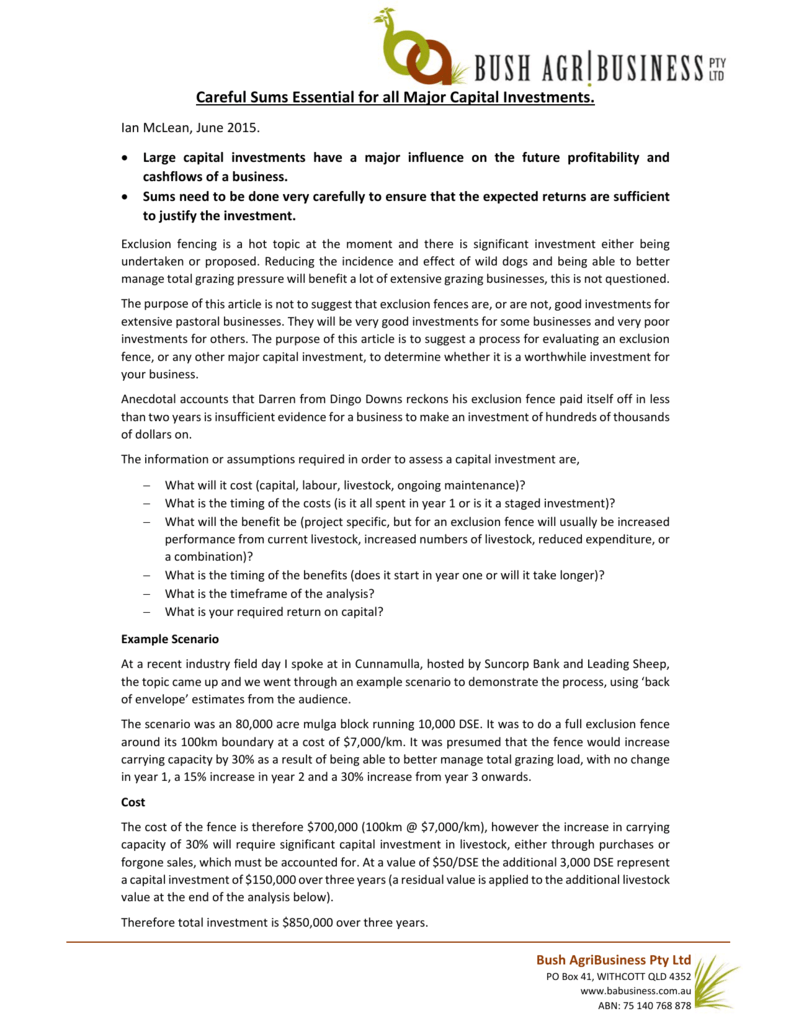
Research and development are not free to a company. By Rosemary Peavler. Heavy industry refers to a type of business that usually carries a high capital cost, high barriers to entry, and low transportability.
For law firms we provide our DirectLaw web service that is a hosted virtual law firm platform for solos and small law firms that enables them to offer legal services on-line without a large capital investment. This cycle occurs in industries which are more capital intensive, i. Around that time, we saw the first regulatory battles form in Appalachia, where plants burning local high sulfur coal were contemplating large capital investments to reach compliance by Increased technology will demand constant upgrading, large capital investmentand tough decisions for brokers to remain on the cutting edge of the industry Gribin. That approach would have left out real estate firms, which typically have relatively few employees but large capital investments. Hydroponic chile growing is very risky and takes a very large capital investment to get it going.

Capital expenditures are major purchases, such as facilities and equipment, that companies make to maintain or expand their operations. Because such purchases involve acquiring assets that provide value and usefulness for a period of several years, companies recover the cost of these acquisitions gradually by depreciating the assets over time. Ordinarily, businesses are not allowed to deduct the full costs of capital expenditures in the year the costs are incurred. Therefore, the substantial outlays of capital required for such purchases must be carefully planned out, usually years in advance, so companies can avoid overextending themselves financially and creating cash flow problems. For capital-intensive companies, good management of capital expenditures is crucial for survival and growth, as it requires striking a proper balance between their needs for the resources required to operate and expand their business and their ability to generate profits or obtain financing.
Capital expenditures are major purchases, such as facilities and equipment, that companies make to maintain or expand their operations. Because such purchases involve acquiring assets that provide value and usefulness for a period of several years, companies recover the cost of these acquisitions gradually by depreciating the assets over time.
Ordinarily, businesses are not allowed to deduct the full costs of capital expenditures in the year the costs are incurred.
Therefore, the substantial outlays of capital required for such purchases must be carefully planned out, usually years in advance, so companies can avoid overextending themselves financially and creating cash flow problems. For capital-intensive companies, good management of capital expenditures is crucial for survival and growth, as it requires striking a proper balance between their needs for the resources required to operate and expand their business and their ability to generate profits or obtain financing.
The companies that consistently have the largest capital expenditures are naturally those with operations that ongoing investments in expensive items, such as land, facilities, infrastructure and major manufacturing equipment. Energy companies and telecommunications firms traditionally top the list. Energy companies can be subdivided into oil, gas and coal producers — the companies that explore, retrieve and refine energy sources — and power companies that deliver energy to businesses and individuals.
Both sectors of the energy industry must regularly make substantial capital investments — oil and gas producers in the equipment required for retrieving and refining natural resources, industry that requires a large capital investment power companies in the massive infrastructure necessary to deliver energy.
Like power companies, telecommunications companies require ongoing investments in infrastructure in addition to research and development and product manufacturing.
Another industry sector that has consistently high capital expenditures is transportation, which includes airlines, railroads and auto manufacturers. Airlines must regularly replace their fleets of aircraft, and auto manufacturers invest massive amounts of capital in research and development in addition to equipment required to manufacture their vehicles.
Other capital-intensive industries include computer industry that requires a large capital investment, healthcareconstruction and hospitality. Financial Ratios. Small Business Taxes. Company Profiles. Your Money. Personal Finance. Your Practice. Popular Courses. Login Newsletters. Compare Investment Accounts. The offers that appear in this table are from partnerships from which Investopedia receives compensation. Related Articles.
Small Business Taxes How do same-year tax deductions work for capital expenditures? Partner Links. Related Terms Energy Sector Definition The energy sector is a category of stocks that relate to producing or supplying energy, i. Infrastructure Definition Infrastructure is the group of basic physical systems of a business or nation.
Healthcare Sector Definition The healthcare sector consists of companies that provide medical services, manufacture medical equipment or drugs, provide medical insurance, or otherwise facilitate the provision of healthcare to patients.
What Is Heavy Industry? Heavy industry refers to a type of business that usually carries a high capital cost, high barriers to entry, and low transportability.
Expansion of Existing Products or Markets The expansion of existing products or target markets means an expansion of the business. Ordinarily, businesses are not allowed to deduct the full costs of capital expenditures in the year the costs are incurred. Secondly, capital investment refers to money invested in a business with the understanding that the money will be used to purchase fixed assets, rather than used to cover the business’s day-to-day operating expenses. Infrastructure Definition Infrastructure is the group of basic physical systems of a business or nation. Airlines must regularly replace their fleets of aircraft, and auto manufacturers invest massive amounts of capital in research and development in addition to equipment required to manufacture their vehicles.

Comments
Post a Comment